Russia-Ukraine war: Putin preparing for prolonged war and will turn to more drastic measures to achieve aims, says US – live | Ukraine
Putin ‘will turn to more drastic means’ to achieve objectives in Ukraine, says US spy chief

Julian Borger
More from Avril Haines, the US director of national intelligence, who said that the Ukraine war is becoming a war of attrition with no end in sight.
Haines said:
Putin most likely judges that Russia has a greater ability and willingness to endure challenges than his adversaries and he is probably counting on US and EU resolve to weaken as food shortages, inflation and energy prices get worse. Moreover, as both Russia and Ukraine believe they can continue to make progress militarily, we do not see a viable negotiating path forward at least in the short term.
The uncertain nature of the battle which is developing into a war of attrition, combined with the reality that Putin faces a mismatch between his ambitions and Russia’s current conventional military capabilities, likely means the next few months could see us moving along a more unpredictable and potentially escalatory trajectory.
The current trend increases the likelihood that President Putin will turn to more drastic means, including imposing martial law, reorienting industrial production, or potentially escalatory military actions to free up the resources needed to achieve his objectives as the conflict drags on, or if he perceives Russia is losing in Ukraine.
The most likely flashpoint for escalation in the coming weeks is around increasing Russian attempts to intimidate western security assistance, retaliation for western economic sanctions or threats to the regime at home.
In his nightly address, Ukrainian president Volodymyr Zelenskiy addressed the death of Leonid Kravchuk, the first president of Ukraine.
He said:
He was not just a politician. And not just a historical figure. He was the man who knew how to find wise words and say them so that all Ukrainians could hear them.
This is especially important in difficult, crisis moments. When the future of an entire country may depend on the wisdom of one person.
Leonid Makarovych showed just such wisdom in the late 1980s, when the Ukrainian movement emerged. He passed 1991 brilliantly, and it is only now that it may seem as if it was easy for him then.
And no matter what happened later, Leonid Kravchuk always stayed with Ukraine.
Perhaps it was because of his wisdom that he was cheerful in a special way. He always valued life, every minute of it. But he always found much more than one minute to help sort things out and give advice. And I am personally grateful to him in particular for that.
As a child he survived World War II, survived the occupation. Leonid Makarovych knew what freedom costs. And with all his heart he wanted peace for Ukraine. I’m sure we will implement it. We will achieve our victory and our peace.
Read more:

Fiona Harvey
The longer the war in Ukraine carries on, the worse the consequences will be for the climate, the US presidential envoy John Kerry has warned.
Many countries are struggling with an energy crisis while also urgently needing to cut greenhouse gas emissions to limit global heating to 1.5C, he said.
“If it’s a long period of time, obviously that makes [staying within 1.5C] very complicated,” Kerry said. “It depends on what happens with the war, where the war goes and how long it lasts. If miraculously we can somehow find a way to resolve some of the fundamental problems in the next six months, then maybe we could just accelerate everything together. I think we can make up some distance [in progress on tackling the climate crisis].”
But he added: “The longer this goes on, the harder it becomes [to stay within 1.5C]. There are a number of scientists who believe we are on the edge of 1.5C now. Anything that is not part of the acceleration [of emissions-cutting efforts] gets in the way.”
He said the agreement reached at the UN Cop26 climate summit last year would have “faced some big hurdles” if taking place in the current geopolitical circumstances, but there was still a chance of fulfilling its promises.
“This is not easy, but it hasn’t fallen apart,” he told the Guardian. “[The effort to stay within 1.5C] has met with an unexpected barrier, the war, and it has met with an unfortunate and dangerous resurgence of business as usual by some parties that threatens the acceleration necessary to get the job done, and it’s going to be up to us to push back and continue with the process.”
The world’s leading climate scientists recently warned it was “now or never” for the world to cut greenhouse gas emissions and avoid the worst ravages of the climate crisis.
Kerry said this showed there was still a chance of holding to the 1.5C goal. “The IPCC said to us a few weeks ago ‘we’re behind, it’s not getting better at the pace it should be, emissions have gone up, but you still have time to do this’,” he said. “And my message to people is we have to take advantage of the fact that the science tells us we still have time, but we have to greatly accelerate what we’re doing. We have to speed up very significantly.”
Read more:
US lawmakers in the House of Representatives are expected to vote on Tuesday evening on a $40 billion aid package for Ukraine. The legislation will then go to the US Senate, where sufficient support is not quite yet in the bag.
However, there is broad bipartisan support for firm US backing of Ukraine following the invasion by Russia in late February.
The defense, humanitarian and economic funding should pass comfortably, with the two parties having reached an agreement on the details, and it will likely move quickly through Congress, AFP writes.
Time is of the essence – and we cannot afford to wait. With this aid package, America sends a resounding message to the world of our unwavering determination to stand with the courageous people of Ukraine until victory is won,” House speaker and California Democrat Nancy Pelosi wrote in a letter to her party colleagues on Capitol Hill.
Congressional leaders struck a deal Monday to release $6.8 billion more than the $33 billion previously requested by the White House to help the Eastern European nation ward off Moscow’s invasion.
The financial boost would include an extra $3.4 billion for both military and humanitarian assistance on top of the funding requested by the administration.
If the package passes as planned, US spending to bolster Ukraine’s defenses against Russia’s invasion and address the ensuing humanitarian crisis will soar to around $54 billion.
The action comes as a top US official warned that Russian President Vladimir Putin is preparing for a long war that may not end with Russian victory in the east.
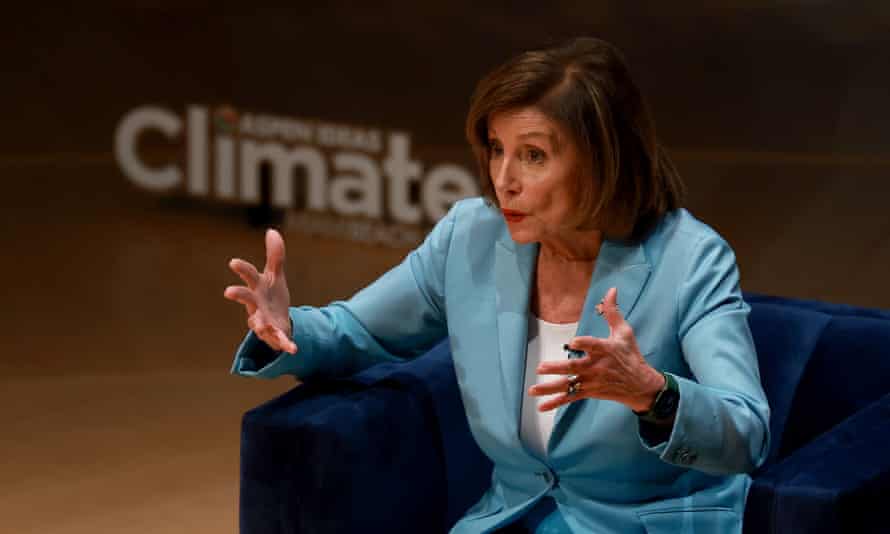
Pelosi met with Ukrainian president Volodymyr Zelenskiy on a visit to Kyiv at the start of this month.
The blog will now hand over from the New York team to California, where my colleague Maanvi Singh is poised to take you through the next few hours.
Italian prime minister Mario Draghi has made further remarks upon his visit to US president Joe Biden at the White House, expressing the desire for negotiations to bring an end to the war in Ukraine.
He thanked Biden for his hospitality in Washington, then turned his remarks to Russia’s invasion of its southern neighbour.
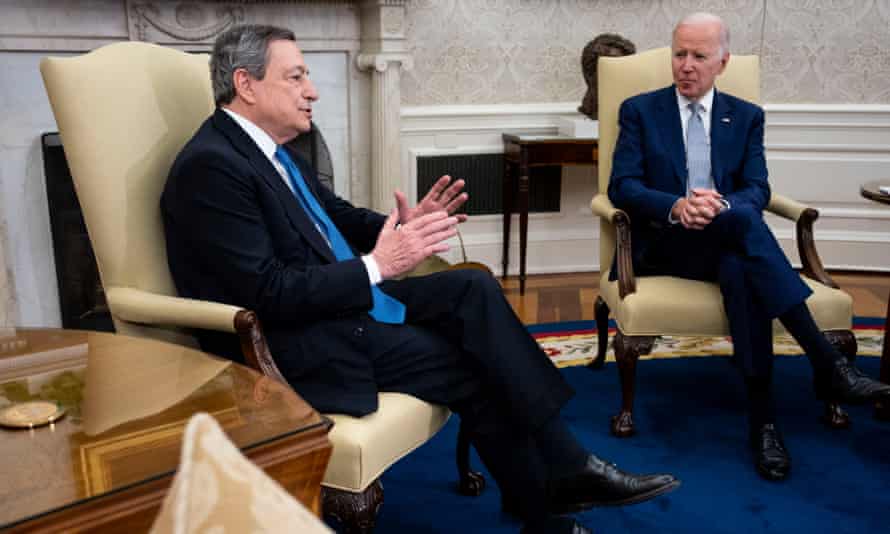
Here is a report from the White House reporting pool. Hopefully the snippet that was inaudible will be filled in later. Draghi said:
The ties between our two countries have always been strong, and if anything this war in Ukraine made them stronger.
Putin thought he could divide us. We stand together condemning the invasion of Ukraine, sanctioning Russia.
But I have to tell you that in Italy and in Europe now, people want to see an end to these massacres, this violence, this butchery.
And people think about what can we do to bring peace.
We certainly have to use any direct (inaudible), but it’s not enough? What can we do?
People want to think about the possibility of bringing a ceasefire and start engaging in credible negotiations. That’s the situation right now.
I think we have to think deeply about how to address this.
We will continue to work on energy security, food security especially which is another issue about which we’ll talk later about what to do.
The other thing I will say – I don’t think we’ll discuss this later – but what happens in Ukraine is going to bring a drastic change in European unity. We’ve always been close. Now, we’re going to be much closer.
I know I can count on your support as a true friend of Europe and of Italy, of course.”
Here are some more images from Ukraine’s vital Black Sea port of Odesa, which came under repeated attack, including from some hypersonic missiles.
One person was killed and five were wounded after seven Russian missiles hit a shopping centre and depot on Monday, the military said.
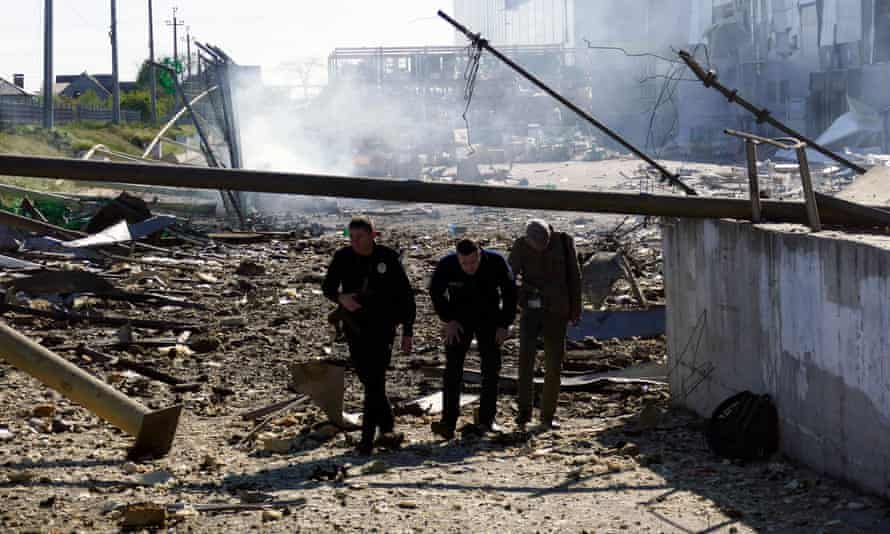
There has been severe damage.
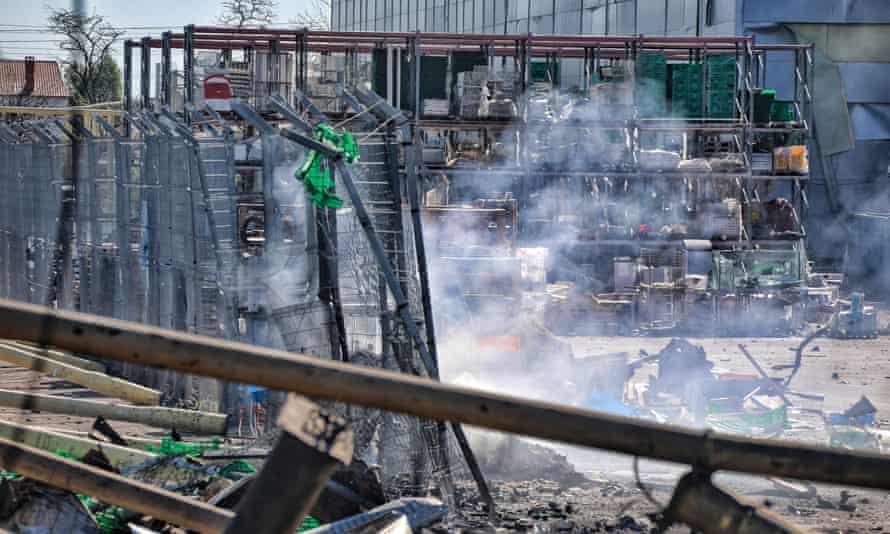
Ukrainian first responders have been working in the rubble.
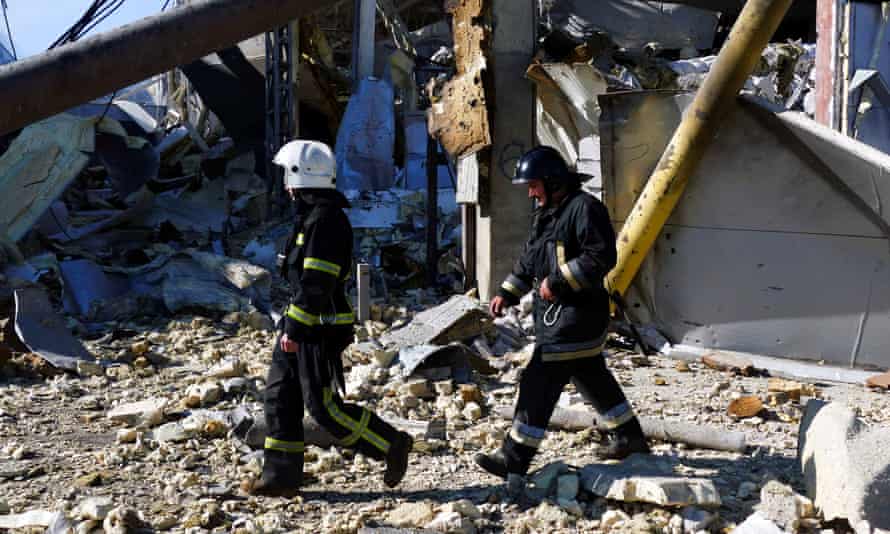
Smoke still rises a day after the shelling in Odesa.
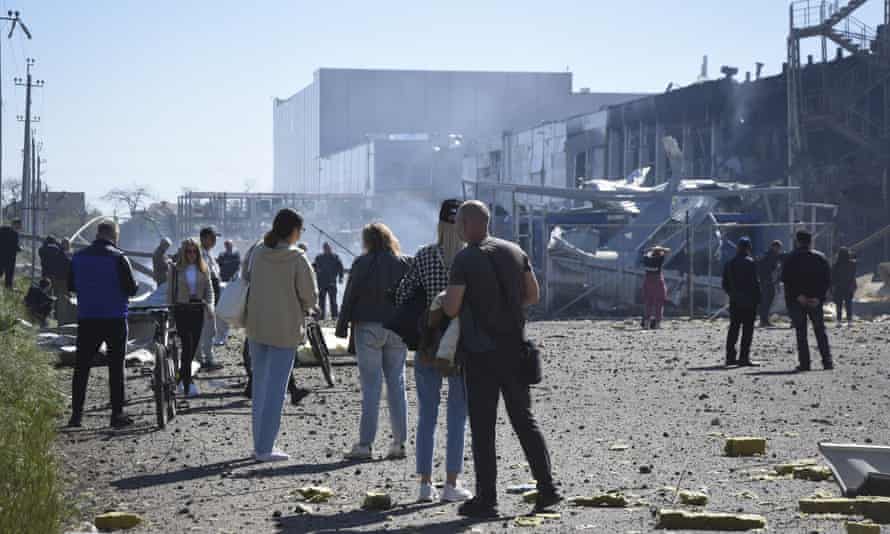
Italian prime minister Mario Draghi and US president Joe Biden stressed transatlantic unity on responding to Russia’s invasion of Ukraine, at the White House on Tuesday, Agence France-Presse reports.
The ties between our two countries will always be strong and, if anything, this war in Ukraine has made them stronger. [Vladimir Putin] thought he could divide us. He failed, we stand together,” Draghi told Biden.
Biden, who hosted Draghi in the Oval Office, echoed the sentiment, referring in comments to the Russian president while reporters were present.
Putin believed he could split us, but we’ve all stepped up,” Biden said.
Despite Italy’s dependence on Russian gas and Rome’s traditionally friendly ties with Moscow, Draghi’s government has been a staunch supporter of efforts to punish Russia for its assault on Ukraine.
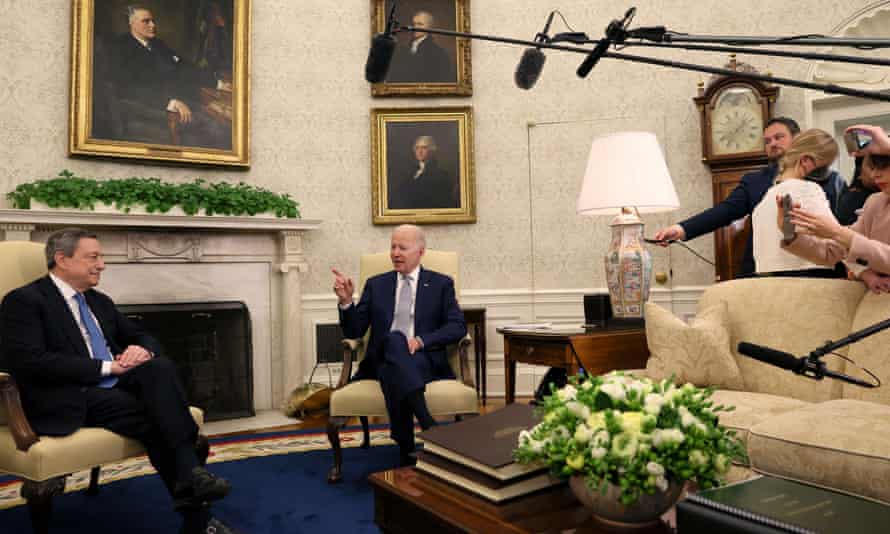
Along with western allies, Rome has sent weapons to support Kyiv, although there is increasing unease about the move within Draghi’s national unity government.
Draghi has also pledged support for any European Union sanctions on Russia’s energy sector despite the risks – 40% of Italy’s natural gas imports come from Russia.
The European Union is currently debating a phased ban on Russian oil imports, although this move would not touch Moscow’s huge gas exports.
With fierce fighting between invading Russian forces and Ukrainian military across a long stretch of Ukraine, there are losses and gains for each side as the advantage fluctuates in different places.
As the vital Black Sea port of Odesa is pounded by Russian missiles, further north in the Kharkiv region Ukrainian officials are talking of having recaptured some territory.
Here are some images coming out from Kharkiv, near the central eastern border with Russia.
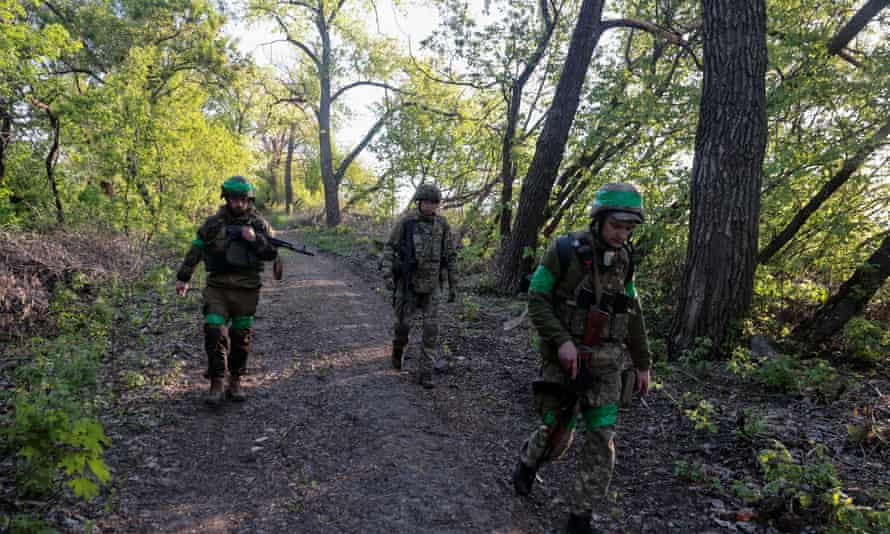
The contrast between spring sunshine, trees with fresh greenery and a certain tranquility belie what has been fierce fighting and destruction in Kharkiv and surrounding villages.
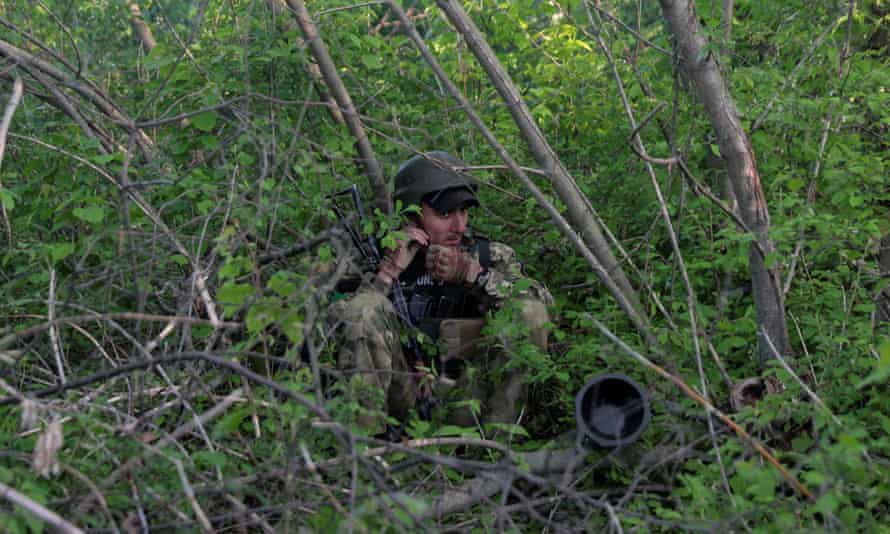
News wires journalists and photographers have captured graphic shots of dead Russian soldiers, which we will refrain from sharing here, but which bolster Ukrainian claims they are making some headway in resisting the Russian advance in that area.
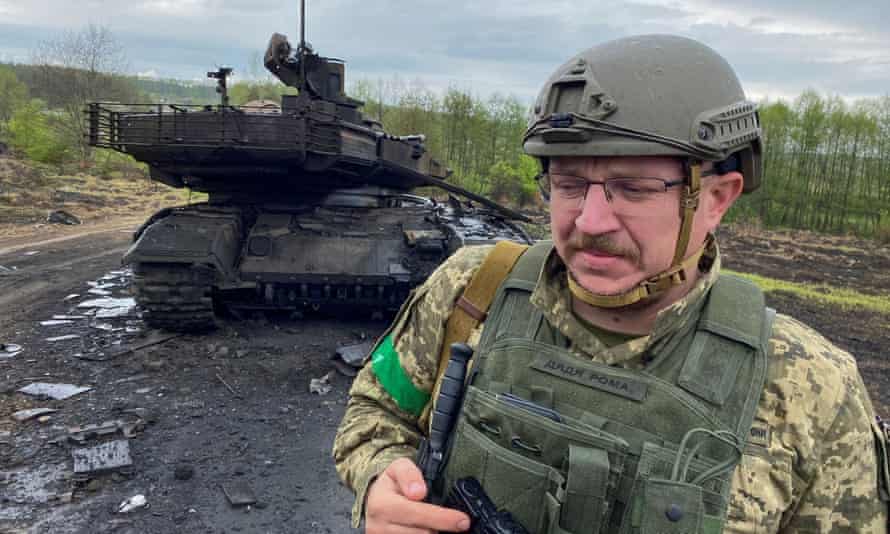
Ukraine announced its forces had recaptured villages from Russian troops north and north-east of Kharkiv, pressing a counter-offensive that could signal a shift in the war’s momentum and jeopardise Russia’s main advance, Reuters reports on Tuesday.
Tetiana Apatchenko, press officer for the 92nd Separate Mechanized Brigade, the main Ukrainian force in the area, in the country’s east, confirmed that Ukrainian troops had in recent days recaptured the settlements of Cherkaski Tyshky, Ruski Tyshki, Borshchova and Slobozhanske, in a pocket north of Kharkiv.
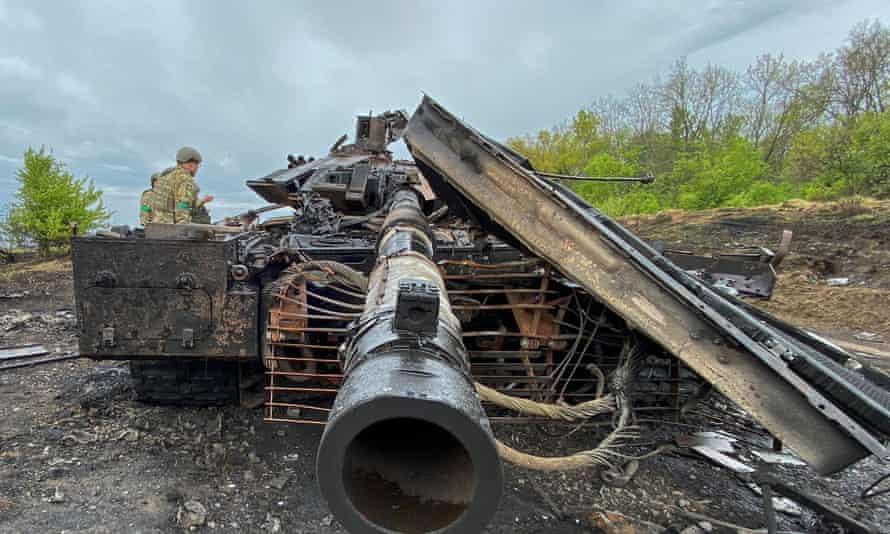
Defence ministry adviser Yuriy Saks said the successes were pushing Russian forces out of range of Kharkiv, Ukraine’s second-largest city and located in the north-east, which has been under perpetual bombardment since the war began.
The military operations of the Ukrainian armed forces around Kharkiv, especially north and north-east of Kharkiv, are sort of a success story. The Ukrainian army was able to push these war criminals to a line beyond the reach of their artillery,” Saks told Reuters.
US officials are now talking about a stalemate. But the counterattack near Kharkiv could signal a new phase, with Ukraine now going on the offensive after weeks in which Russia mounted a massive assault without making a breakthrough.
By pushing back Russian forces who had occupied the outskirts of Kharkiv since the start of the invasion, the Ukrainians are moving into striking distance of the rear supply lines sustaining the main Russian attack force further south.
They’re trying to cut in and behind the Russians to cut off the supply lines, because that’s really one of their (the Russians’) main weaknesses.
Ukrainians are getting close to the Russian border. So all the gains that the Russians made in the early days in the noerth-east of Ukraine are increasingly slipping away,” said Neil Melvin of the RUSI thinktank in London.
Summary
It is 9pm in Kyiv. Here’s where we stand:
- Belarus will deploy special operations troops in three areas near its southern border with Ukraine in response to a “growing threat” by the US and its allies, the armed forces said. The Belarusian president, Alexander Lukashenko, said Moscow had agreed to help Minsk produce missiles to beef up its military capabilities.
- The number of civilians killed in Ukraine since the beginning of the war is “thousands higher” than official figures, the head of the UN’s human rights monitoring mission in the country said. The official UN civilian death toll in Ukraine stands at 3,381, as well as 3,680 injured.
- France has said a deal on a proposed EU ban on Russian oil could be struck this week, despite opposition from the Hungarian prime minister, Viktor Orbán, who has compared the plans to an atomic bomb. Clément Beaune, an ally of Macron and France’s Europe minister, said he thought “we could strike a deal this week”.
- Russia has been blamed for a massive cyber-attack against a satellite internet network an hour before Vladimir Putin ordered his troops to invade Ukraine. The digital attack on Viasat’s KA-SAT network in late February took thousands of modems offline and helped facilitate Putin’s invasion of the country, the Council of the EU said.
First president of Ukraine Leonid Kravchuk dies
The first president of independent Ukraine, Leonid Kravchuk, has died after a long illness, local news has reported.
Ukrainian MP Dmitry Razumkov said Kravchuk, who served as president from 1991 to 1994, was “a figure who stood at the origins of modern Ukrainian statehood”.
Ukrainian presidential adviser Anton Gerashchenko tweeted that Kravchuk was “a historic figure and played a huge part in Ukraine becoming independent peacefully”.
From our Isobel Koshiw:
Ukraine’s 1st president Kravchuk dies at age 89, a Soviet ideologue turned Ukrainian independence advocate. There are conflicting opinions about what he did, inc the Budapest Memorandum. In his later years, despite his poor health, he always seemed to find time for journalists https://t.co/Vd1ePQavEo
— Isobel Koshiw (@IKoshiw) May 10, 2022
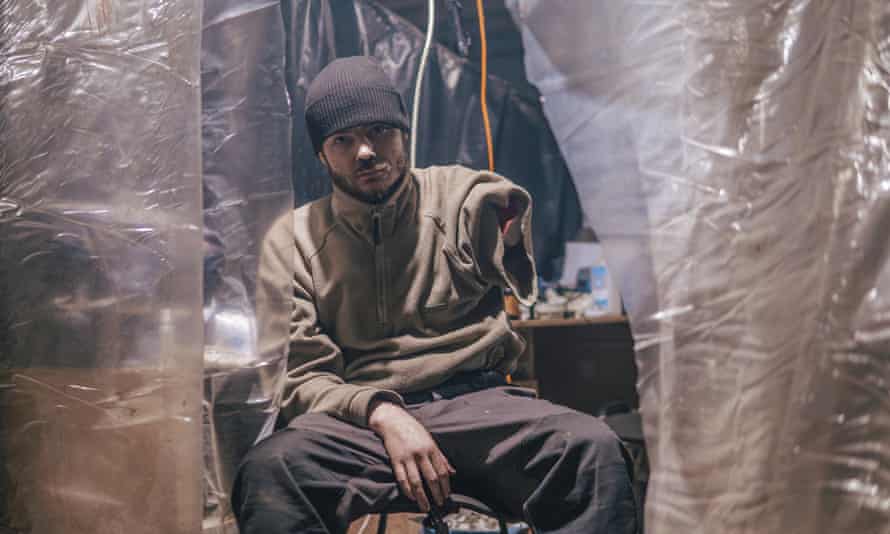
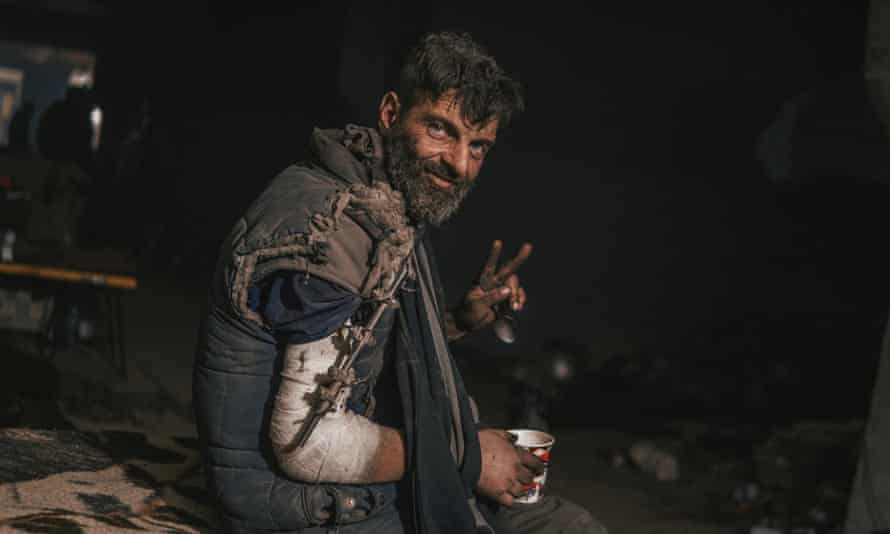
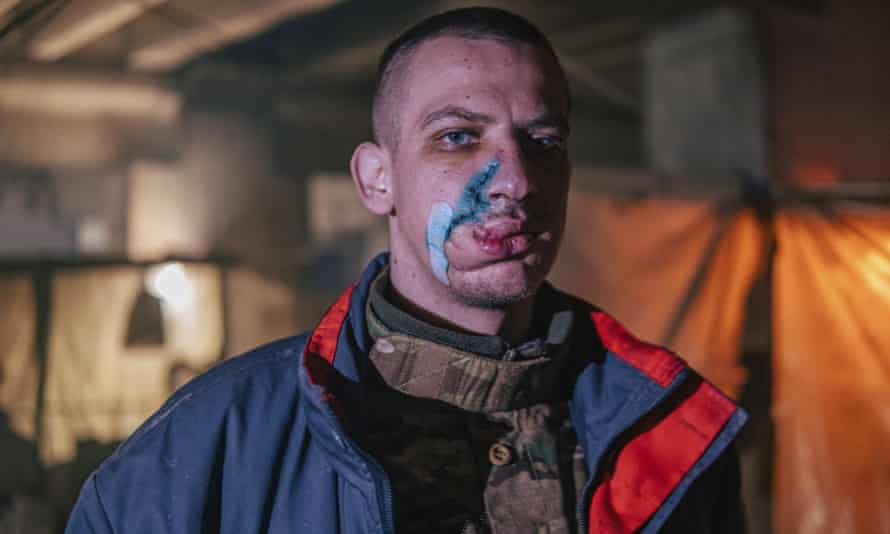
Four Russian regional governors resigned today as the country braces for the impact of economic sanctions, Reuters reports.
The heads of the Tomsk, Saratov, Kirov and Mari El regions announced their immediate departures from office, while the head of Ryazan region said he would not run for another term. Elections for all five regions are scheduled to take place in September.
Russian regional governors are elected but are politically subordinate to the Kremlin. Unpopular governors are regularly removed from office.
Several of the outgoing governors represent regions where the ruling bloc United Russia took weak vote shares in parliamentary elections last year.
From András Tóth-Czifra, a political analyst at the Center for European Policy Analysis:
Indication that the Kremlin may not cancel the September regional elections, after all, or at least not yet: the regular spring gubernatoropad has started. The unpopular heads of two “hot” regions, Tomsk and Kirov, are leaving their offices. https://t.co/QXdlSvpnMN
— András Tóth-Czifra 🇺🇦 (@NoYardstick) May 10, 2022
As I mentioned above, resignations like this happen often, but not so often does one see so many on the same day (and the day is not over yet!), suggesting that the while an informal ban on cadre changes may have been lifted, the Kremlin wants to get this over with swiftly.
— András Tóth-Czifra 🇺🇦 (@NoYardstick) May 10, 2022
The Kremlin is removing weak governors amid a worsening economic outlook for Russia, driven by western sanctions, according to Ilya Grashchenkov, head of the Centre for the Development of Regional Politics thinktank in Moscow.
Grashchenkov said:
There’s a need to restructure the economy, especially in those regions where western economic influence had been significant. These governors need to be replaced by younger alternatives.
Russia’s economy ministry has said that the economy is set to contract by 8.8% in 2022.
The US believes that Russia is about two weeks behind schedule in its invasion of Ukraine’s Donbas region as well as the south of the country, according to a senior US defence official.
The official, speaking on condition of anonymity, said:
We would assess that he’s [Vladimir Putin] easily two weeks or even maybe more behind … where he thought he wanted to be in the Donbas and in the south.
The US assesses that Putin has not achieved any of his strategic goals so far in the Donbas or in Ukraine, and that his focus remains on the Donbas, the official said.
From Foreign Policy’s Jack Detsch:
U.S. believes that Putin’s focus remains on the Donbas: senior U.S. defense official
Russia “certainly wants a land bridge to Crimea, with the exception of Mariupol, he essentially has,” the official said.
— Jack Detsch (@JackDetsch) May 10, 2022
U.S. does not have “absolute certainty” about Putin’s long-term plans for Ukraine: senior U.S. defense official
Putin could simply declare victory in Donbas or use further control of the region to stage a further attack. The U.S. isn’t sure that the Kremlin has given up on Kyiv.
— Jack Detsch (@JackDetsch) May 10, 2022
When the war started journalists in Ukraine found themselves at the centre of the biggest story in the world. They became war correspondents overnight.
Ukrainian journalists were spotlighted this week when the Pulitzer prize board awarded them with a special citation, hailing the country’s reporters for the “courage, endurance and commitment to truthful reporting” they have shown since the Russian invasion.
But initially, writing stories and making television reports was secondary for the reporters, editors, and producers who heard explosions around them and scrambled for safety. For more than a month many Ukrainian journalists focused on survival. Some have since returned to work, but often they lack protective equipment and hostile environment training.
“Lots of journalists left Kyiv,” said Kristina Berdynskykh, a journalist at one of Ukraine’s major independent publications, Novoye Vremya. “They weren’t thinking about whether they’d be fired, they were just thinking that they had to get their families out.”
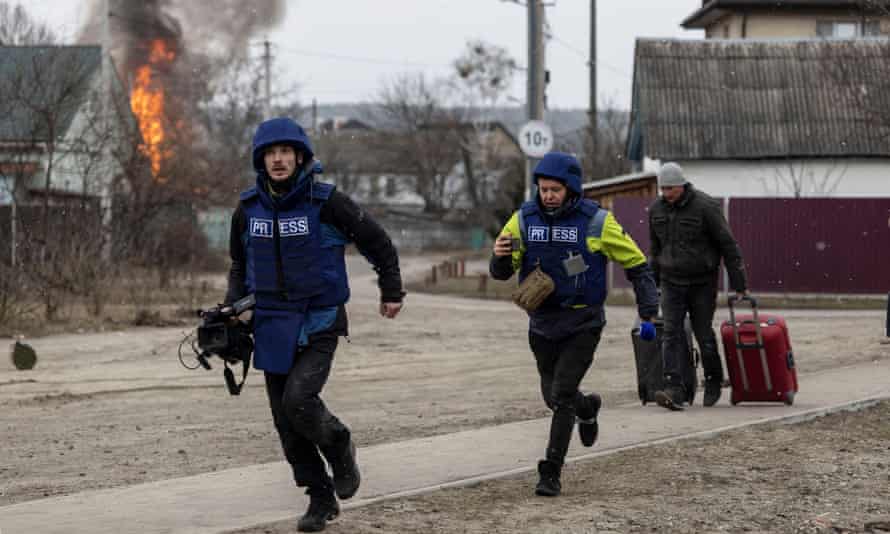
After the first few days almost all of the staff of Ukraine’s prominent newsrooms fled westwards to Lviv where many remain. Lviv quickly became the new temporary capital when Russian forces surrounded Kyiv.
“From the print journalists I know, there was maybe a handful left in Kyiv,” said Berdynskykh. “It is mostly the TV stations who had small teams of war correspondents who had experience in the Donbas. For everyone else, the situation was an absolute shock.”
Those who stayed in Ukraine’s hotspots embarked on new careers. Berdynskykh spent 18 nights sleeping on the floor in Kyiv’s metro to avoid the shelling and conducted phone interviews. Without a car or taxis, and with shells flying into the city, in-person interviews were near to impossible for the first month she said.
“At first it was practically just western journalists – war correspondents – doing on-the-ground reporting,” said Berdynskykh, who was a leading political reporter but is now focusing on the experiences of ordinary Ukrainians around the country. “But I’m grateful to them because we were still adapting.”
Lukashenko warns Belarus can ‘inflict unacceptable damage’ as special troops deployed to border near Ukraine
Belarus will deploy special operations troops in three areas near its southern border with Ukraine in response to a “growing threat” by the US and its allies, the armed forces said, as the Belarusian president, Alexander Lukashenko, said Moscow had agreed to help Minsk produce missiles.
The Belarusian chief of general staff, Viktor Gulevich, said:
The United States and its allies continue to build up their military presence on the state borders of Belarus. The strength of this force has more than doubled in the last six months.
He said the build-up of military presence by western allies “testifies to a growing threat to the Republic of Belarus”, adding that Belarus is also deploying air defence, artillery and missile units for drills in the west.
The announcement comes after Lukashenko earlier today said Moscow had agreed to help Minsk produce missiles to beef up its military capabilities.
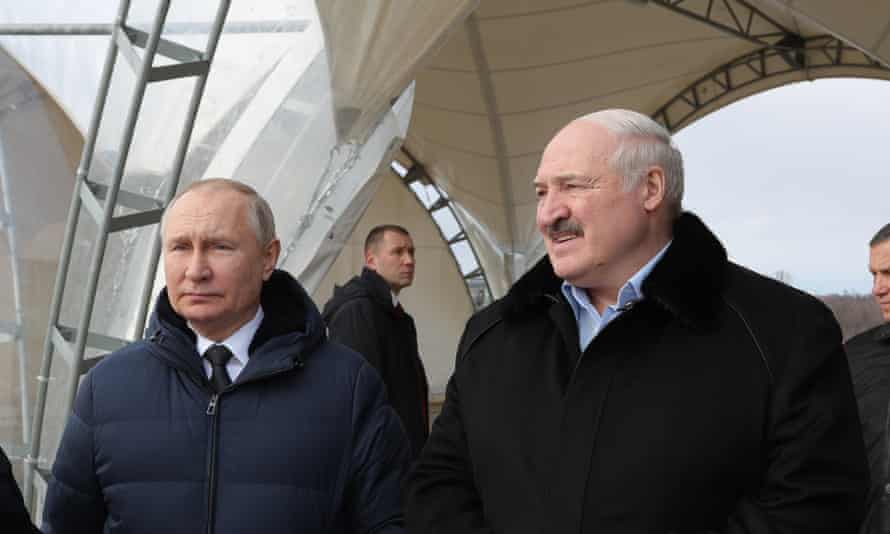
Speaking at a meeting of defence officials, Lukashenko was quoted by the state-run news agency Belta as saying that events in Ukraine had demonstrated the importance of having troops with modern, highly effective weapons and supplies.
Lukashenko said he won the support of the Russian president, Vladimir Putin, for people involved in missile production in Russia to take a look at Belarus’s developments in that area.
He said the Belarusian army was combat-ready and will be able to “inflict unacceptable damage on the enemy” in case of external aggression, adding:
We are realists, we understand that we will not be able to defeat Nato. However, we have all the weapons to do damage, especially to the territories from which we will be attacked.
The Belarusian president said he was “not hinting at anything, but I want everyone to understand the range of the weapons we have”.
The number of civilians killed in Ukraine since the beginning of the war is “thousands higher” than official figures, the head of the UN’s human rights monitoring mission in the country has said.
The official UN civilian death toll in Ukraine stands at 3,381, as well as 3,680 injured but the UN’s Matilda Bogner said places such as Mariupol were still a “black hole” in the UN’s data collection, but thousands more would be added to the official death toll once verified.
Russia’s war in Ukraine is at a “bit of a stalemate”, Lt Gen Scott Berrier, the head of the Defense Intelligence Agency, told the US Senate armed services committee.
Berrier said:
The Russians aren’t winning and the Ukrainians aren’t winning and we’re at a bit of a stalemate here.
He added that so far, between eight and 10 Russian generals have been killed in the war.
Asked about the prospect of Putin using tactical nuclear weapons, Berrier said:
Right now, we do not see that.
